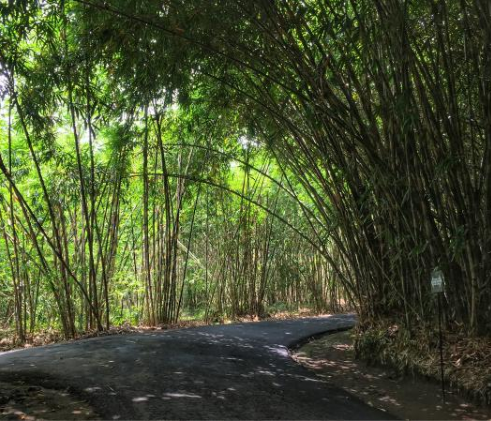The Penglipuran
village in Bali is awarded as the 3 top
cleanest village in the world
Bali’s Penglipuran village is awarded as the 3
top cleanest village in the world besides Giethoorn village in Belanda, and
Mawlynnong in India. The village is located in Bangli regency, one of
the nine regency in Bali. When you
travel from Denpasar, about one hour and a half (45 kilometers) to the Bangli
regency. The Penglipuran village is a traditional village
which has their own character, belong to the district Kubu- Sub district Kubu
and untouchable by modernization lifestyle.
It’s located at the height of 700 meters above the sea level as giving
the fact the fresh air and cooler weather than southern Bali island. It is very pleasant to walk around the clean
village.
The Penglipuran’s
panorama, it’s clean village, and its unique culture attracts a lot of visitors
from all over the world. The place is also easy to reach from the neighboring
tourist area, and the village is not far from the coolness of Kintamani,
Tampaksiring and Tirta Empul (Gianyar Regency).
History:
The name of
the Penglipuran village, according to the mythology of the elders of
Penglipuran village, came from the word “Pengeling Pura” (remember your
temple), it literally means remember
your ancestors from the Bayung Gede.
This mythology was connected with the movement of their ancestors from the
Bayung Gede village at Kintamani to become permanent residents at Penglipuran
village along with their culture and traditional lifestyle.
The village
administration is very simple, it consists of a custom village with one Banjar and administration is very easy
to manage.
The Balinese
traditional houses which are divided into two parts, the west and east of
single road. All the houses have the same form of the front. This section is
made of dirt material for walls and bamboo for the roof. The front of the house
has Angkul-angkul or gate which functioned as a building guard. At the special
religious ceremony, this section will be a place of offerings and is used as a
place to worship God and ancestors.
The houses
were lined from top to bottom of the hill. Among the houses have a
very clean village street. Mostly Village
roads are quite, but it will be more people on the road in the afternoon when
people go home from their work, and for some mingle with their neighbors to socialize. The main road stretching from north to south
are not made of asphalt, but from the rock mountain that is modified into
paving or stone ConBlock.
The Village
territory is divided into three parts is called the Tri Mandala. In the north
corner of the village there is a shrine (the main theater), it's called Pura Bale
Agung (Upgrading), which became the main place of Balinese Hindu ceremony. And in the middle there are parks and residential homes.
In the
lowest part of the village, there is a cemetery complex (Setra). The concept of
the Tri Mandala does not only apply to village spatial layout, but the Tri Mandala concept is also apply for
residential each house. The house follows the concept of the Tri Mandala: On
the front part of buildings, there are buildings Angkul-angkul or gate and an empty space is called Natah ; the center is the family gathering place,
and at the very back there is a toilet.
When is
the best time to visit the Penglipuran?
You can visit the village anytime, but if you would like to see more
attractions of the village including special ceremonies in the village. I choose the months of April, May, June, and July are considered the
best time to visit the village for more attractions.






No comments:
Post a Comment